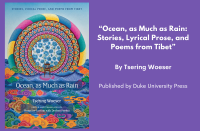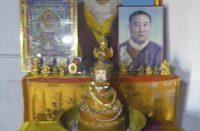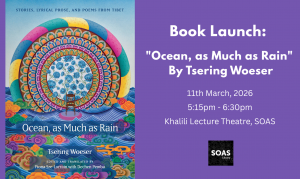
High Peaks Pure Earth presents English translations of blog posts written in tribute to the young poet, writer and environmentalist Khawa Nyingchak who tragically passed away on June 26, 2015.
The first blog post is by well-known Tibetan monk and intellectual Gosher (Full name: Go Sherab Gyatso) and titled “A Way to Remember Khawa Nyingchak”. It was written the day after Khawa Nyingchak’s passing and posted on a Tibetan language website. In the post, Go Sherab Gyatso also highlights important environmental concerns and issues for the area.
The second post is a “biographical eulogy” which was disseminated on WeChat in August last year via a forum called ANUbooks. The post appears to be a collection of writings by Khawa Nyingchak about himself at various stages of his life.
For further reading about Khawa Nyingchak, don’t miss this touching and thoughtful eulogy by Tibetan scholar Tashi Rabgey that was widely circulated on WeChat at the end of last year. A piece of writing by Khawa Nyingchak titled “Notes From My Return Home” is also available online here in English, translated by Sertso Kyi and Tsepak Namgyal.
Thank you to Palden Gyal for sourcing the materials below and for the translations.
“A Way to Remember Khawa Nyingchak”
By Gosher (Go Sherab Gyatso)
Since birth and death are inevitable and ultimate nature of phenomena as conditions of existence, of the billions of human beings on earth scattered across the continents like clusters of ant colonies, every day thousands and thousands meet their ultimate finality in different circumstances. Of the small crowd of my acquaintances, every now and then, regardless of age I see people die and disappear like a streak of lightning. To be honest, quite naturally, I grieve and mourn an acquaintance’s death differently. I think considerations like a person’s efforts and exploits, the cause of his or her demise, and my own personal relationship with the individual chiefly influence how I mourn a death. Last night, I heard Khawa’s sudden death. Personally, we were not close friends, and my acquaintance with him is limited to a few meetings and conversations. Nevertheless, the news of his sudden demise gave me an unusual sense of bereavement and heartache. The tragic news of his death haunted my whole day. Yes, it is true, as many would agree; Khawa was one of the most promising young Tibetan writers, and as a rare kind of intelligent and dedicated young Tibetan, it is indeed a tremendous loss. But, let’s not talk about this or remember him this way. One might rebuke me if I continue, quite accurately perhaps, that, “It is characteristic of Tibetans to admire and elevate the dead and detest and loathe the living.” Be that as it may, I think there is one significant issue that we cannot avoid thinking and remembering about Khawa. He was an individual who sacrificed his precious human life in order to protect the natural environment and the ecology of Tso-Ngonpo Lake.
These days we hear from both the government as well as individual experts that the ecological condition of the Tibetan plateau is extremely fragile yet it is so significant because the impact of its degradation affects not just Tibetans but billions of people across Asia. We hear this catchphrase of “environmental protection and conservation” almost like the mani mantra of our daily prayers. Despite all the mantra, I wonder why there are increasing number of cases of environmental destruction and ecological disturbance across the plateau. In the midst of all the mantras and sloganised promotions of “environmental protection and conservation,” our mountains and grasslands, our lakes and rivers, and our wildlife and forests are increasingly “illegally” demolished, defaced and decimated. When the hearts, eyes, and all parts of Mother Nature are sheared off in different regions of the Tibetan plateau, where are our “environmental protection laws”? Where did the Offices of Nature and Environmental Protection go? Where did the police and security personnel run away? No, they have not gone anywhere. When you observe it closely, it is the connivance of the local officials with wealthy businessmen engaged in the vicious activity of destroying the environment. As a result, even the most sacred lake of the Tibetan plateau (Tso-Ngonpo), the beautiful turquoise mirror smiling across the chest of the Plateau, is fraught with fishnets set “illegally” by greedy businessmen in collusion with local officials. The prevention of such illegal activities is not the responsibility of a writer who has nothing but a pen in his hand. It is the unavoidable responsibility of those Offices with elegant signboards hanging on their walls. Isn’t it for that purpose and service we pay our taxes that feed and clothe them?
However, last night, when Tso-Ngonpo, the turquoise mirror of the Tibetan plateau, was annexed by an army of steel-fishnets and her gold fishes panicked, those tax-funded officials must have gone asleep, snoring and dreaming after satisfying themselves with alcoholic drinks and meaty dishes. There was no sign of them. Meanwhile, a young Tibetan who loved and adored his homeland sacrificed his life in an attempt to free the thousands and thousands of gold fishes trapped in those nets. He dived deep into the sea, and left us forever. This young man was Khawa Nyingchak, a young Tibetan poet and author of children’s stories, and who was also an environmental activist. His final act of conscience and sacrifice has made him a symbol of environmental protection and preservation. I hope we will remember Khawa Nangchak like the courageous Gyesang Sonam Dhargye who sacrificed his life protecting Tibetan antelopes in Achen Gang-gyab (Kekexili: Mountain Patrol), and in his memory we should erect a statue of him visible prominently to the mountains, grasslands, lakes and gold fishes of Tso-Ngonpo. In this way, we shall carry on Khawa’s legacy and continue his dreams, and he can leave us in peace. It will inspire and serve as a wake-up call for Tibetans of this and future generations in raising awareness about protection and preservation of natural environment.
June 26, 2015
Khawa Nyingchak

Khawa Nyingchak, a young Tibetan writer, was born in Tso-Ngonpo in 1989. Khawa graduated from Northwestern Nationalities Normal University with a degree in literature. He was also an enthusiast and amateur filmmaker. In addition to many essays and articles, Khawa wrote two books: a prose and a children’s storybook under the same title “The Moth.” He also directed and produced the short documentary “Children of Zachukha.” On June 26, 2015, Khawa sacrificed his life in an attempt to protect and free aquatic lives caught in the illegal fishnets set by Chinese poachers in the sacred lake Tso-Ngonpo.
A Biographical Eulogy
 When my mother gave birth to me, she decided to call me “Nyingchak” or “Steeled Heart,” and that was a winter many years ago. There was an unusually big snowfall that winter, and I as a guest on earth crawled into existence at a very cold and windy hour. I decided to call myself Khawa (“snow”) Nyingchak, because I consider the essential core of my existence formed and flourished at the grace of cold wind and snow. I am Khawa Nyingchak, and I have a dream, an aspiration. I wish to transform my blood and bones into a pen, and write just the word “freedom” across the heart of a vast stretch of land.
When my mother gave birth to me, she decided to call me “Nyingchak” or “Steeled Heart,” and that was a winter many years ago. There was an unusually big snowfall that winter, and I as a guest on earth crawled into existence at a very cold and windy hour. I decided to call myself Khawa (“snow”) Nyingchak, because I consider the essential core of my existence formed and flourished at the grace of cold wind and snow. I am Khawa Nyingchak, and I have a dream, an aspiration. I wish to transform my blood and bones into a pen, and write just the word “freedom” across the heart of a vast stretch of land.
 My mother said, everyday at sunset, she returned home carrying me in the front of her sheepskin robe. Because I had always managed to find a time before noon to take a leak in the back of her sheepskin robe, and in the evening too, I had hardly missed to relieve myself in the front. At night, when my mother unties her robe, the sheepskin robe would have dried and hardened like a pair of metal pans.
My mother said, everyday at sunset, she returned home carrying me in the front of her sheepskin robe. Because I had always managed to find a time before noon to take a leak in the back of her sheepskin robe, and in the evening too, I had hardly missed to relieve myself in the front. At night, when my mother unties her robe, the sheepskin robe would have dried and hardened like a pair of metal pans.

When I was very young, most of the people in my hometown still lived in black tents. I still remember very vividly. One night, when I was lying between my parents in bed and before I fell asleep, I saw thousands and thousands of stars shimmering in the night sky through the small vent of our black tent. Each glittering star felt like an eye of a child defying sleep in silent wonderment. That night, my father told the story, “the son of the rich and the son of the poor,” and saw me off to sleep, to dreamland.

I grew up near Tso-Ngonpo (Kokonor Lake). In the summer, when the weather was very warm, I used to play at the lakeshore. In those times, it was all calm, still and serene, and I did not get to set my eyes on its towering waves rising magnificently against the sky. Today, sitting nearby the window and listening to the gusty wind roar, I wish to picture and imagine the mighty waves of Tso-Ngonpo heaving with rage.

Since very early in my life, I wished to go beyond our valley to distant places. Under the light of star-studded night sky, trampling on wild plants and dirt, I long to walk forward and go beyond the horizon. Standing on a peak in a range of mountains, I wait for the return of my forefathers who have long gone far away. And in this depth of solitude, I stare at manes of a herd of stud horses with dumb surprise.






Follow Us!